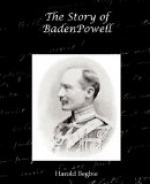And the refrain, which every man present sings with a face as solemn as my Lord Chancellor sitting on the Woolsack half an hour longer than usual, runs in this fashion:—
Oh, ’tis a famous story;
proclaim it far and wide,
And let your children’s
children re-echo it with pride,
How Cardigan the fearless
his name immortal made,
When he crossed the Russian
valley with his famous Light Brigade.
This is the great glory of the regiment, the knowledge of which makes the recruit blow his chest out another inch and straightway purchase out of his pay spurs that jingle more musically when he goes abroad than the miserable things served out by an unromantic Government. Other legends there are in this regiment, and once Baden-Powell and his great friend, Captain MacLaren (known to the officers as “The Boy,” to the men as “The Little Prince"), set about compiling its history; but for some reason or another that work has not yet appeared, and since its inception B.-P. has deserted to the Dragoons—Vestigia nulla retrorsum!
Baden-Powell became popular with his brother-officers directly he joined. It was his freshness, his overflowing good spirits, his hearty and unmistakable enjoyment of life, that first won their regard. The boy suddenly dropped into their midst was no blase youth, no mere swaggering puppy. He was afire with the joy of existence, radiant with happiness, excited—and not ashamed to show it—by all the newness and fascination of Indian life. The Major screwed his eye-glass into his eye and smiled encouragingly; the Adjutant measured him with peg to his lip and knew he would do. Every one felt that the new sub was an acquisition.
But it must not be supposed that there was any “bounce” about the new boy. Apart from his breeding and training, which would effectually prevent a man from committing the unpardonable sin of the social world, Baden-Powell by nature was, and still is, a little bashful. There are people who pooh-pooh the very idea of such a thing, and declare that the man they have heard act and sing and play the fool is no more nervous than a bishop among curates. Nevertheless they are wrong; and your humble servant entirely right. B.-P., like the other members of his family, suffers from nervousness, and when he goes on the stage to act, and sits down at the piano to “vamp,” it is a sheer triumph of will over nerves. He is not nervous under the wide and starry sky, not bashful when he pricks his horse into the long grass of the veldt and bears down upon a bunch of bloodthirsty savages, not nervous when he gets a child on his knee all by himself and tells her delightful stories,—but nervous as a boy on his first day at school when he finds himself being lionised in a drawing-room, or picked out of the ruck of guests for any particular notice. And so when he joined the 13th, behind the ebullient spirits was this innate bashfulness, which, added to the natural modesty of a gentleman,




